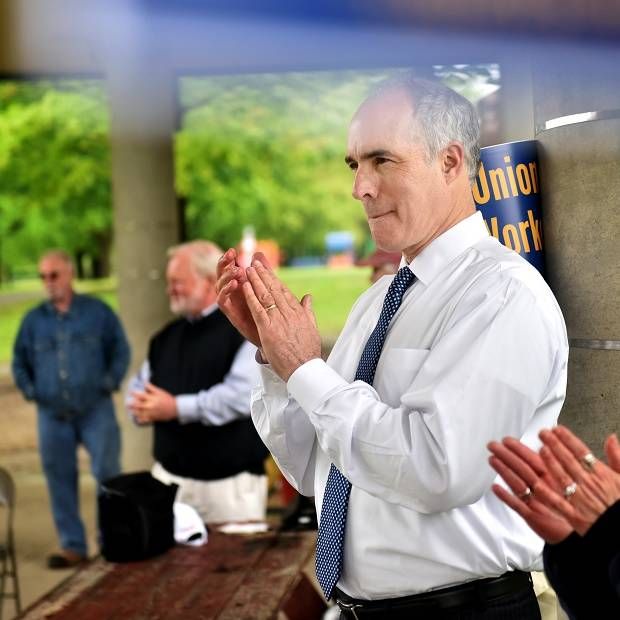Click here to subscribe today or Login.
HARRISBURG, Pa. (AP) — Pennsylvania’s Democratic Sen. Bob Casey returned to the state on Friday to hammer the Republican health care bill in the U.S. Senate, saying it poses a foundational retrenchment of Medicaid that could have a dramatic, long-term effect on American society.
Casey, who is running for re-election for a third term next year, warned that it could also mean coverage losses for people with employer-sponsored insurance, in addition to those covered by Pennsylvania’s $30 billion Medicaid program, a federal-state partnership.
“If they do to Medicaid what they’re trying to do, it’s not just a health care adverse outcome, we will be a different country, we’ll be a different society, because we won’t be taking care of people that most of us believe we should take care of,” Casey told reporters in the Pennsylvania Capitol after he led a rally against the bill. “This will change our country radically. That’s why no one has attempted to do to Medicaid what they’re trying to do now.”
The bill’s payoff for the decimation of Medicaid, Casey said, is to deliver a tax cut to the “super rich.”
Senate Republicans released the long-anticipated bill Thursday after weeks of closed-door meetings searching for middle ground between conservative and centrist senators in an effort to make good on promises to dismantle former President Barack Obama’s signature health care law.
The bill could come to a vote as early as next week. Pennsylvania’s Republican U.S. Sen. Pat Toomey, who helped write the bill, said he is likely to vote for it, in part because it puts Medicaid on a sustainable path that will make it more affordable in the future.
Casey and others say the bill poses a bigger threat to Pennsylvania’s health care system than many other states, partly because of Pennsylvania’s relatively generous Medicaid program and partly because of its relatively older and costlier population.
Also opposing the bill in the hours after it emerged were Democratic Gov. Tom Wolf, the Hospital and Healthsystem Association of Pennsylvania, the Arc of Pennsylvania, the AARP of Pennsylvania, children’s advocacy groups and labor unions.
Nearly 2.9 million Pennsylvanians are on Medicaid, or almost one in four Pennsylvanians, and about 1 million more than a decade ago, according to state figures.
The federal government pays slightly more than half the bill for most people on Medicaid. It pays nearly the whole bill for the more than 700,000 primarily childless low-income working adults who joined Medicaid after Jan. 1, 2015, when Pennsylvania expanded income eligibility guidelines to take advantage of the more generous federal contribution rate under Obama’s law.
Under the Senate bill, the federal government would still commit to funding the Medicaid expansion, albeit at a roughly 52 percent rate in Pennsylvania, compared to the 90 percent long-term rate under Obama’s law. The bill’s cap on Medicaid costs also would allow that expense to rise with inflation, more slowly than the program’s historical growth rate.
Wolf’s administration said the effect means the loss of billions of federal health care dollars annually to Pennsylvania.
The most expensive Medicaid enrollees are the elderly and disabled, accounting for fewer than one-third of all enrollees in Pennsylvania, but driving nearly two-thirds of the program’s cost. If the federal government caps its Medicaid contributions, medical care for more than 1 million children on Medicaid in Pennsylvania will suffer, because their needs will be forced to compete with the needs of the disabled, elderly and parents, children’s groups said.
“Where are we going to find the billions of dollars?” questioned Joan Benso, president and CEO of the Harrisburg-based nonprofit Pennsylvania Partnerships for Children.
Maureen Cronin, executive director of the Arc of Pennsylvania, said squeezing Medicaid coverage for the disabled could have a perverse effect on families. Instead of caring for a disabled relative at home, where it is less expensive, cutting funding for home help aides might prompt families to seek out the more expensive option of institutionalizing their disabled relative, Cronin said.
“They can’t fight the fight any more,” Cronin said.





